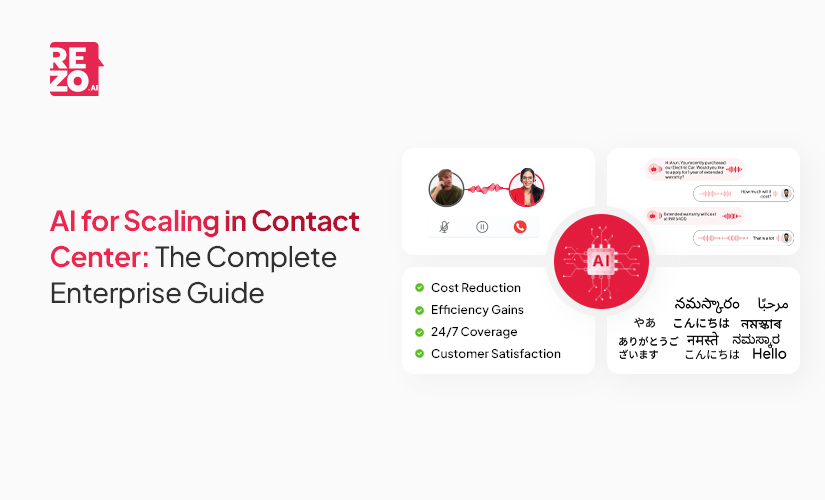
Agentic AI for Customer Service

Agentic AI for Customer Service


In today’s hyper-connected world, customers expect more than ever from the brands they interact with. They demand instant, 24/7 support, seamless transitions across channels, and personalized experiences tailored to their unique needs. Meeting these rising expectations has become a defining challenge for enterprises striving to deliver exceptional customer experience (CX).
For years, businesses have relied on rule-based chatbots, voicebots, and a patchwork of AI tools to handle customer inquiries. While these solutions have helped automate simple tasks and provide basic assistance, they often fall short when faced with complex issues, multi-step issues or the need for true personalization. Customers are quick to notice when they’re interacting with rigid scripts or when their context gets lost between channels, leading to frustration and missed opportunities for engagement.
Agentic AI agents address these challenges by transforming customer service from fragmented and reactive to unified and predictive. Unlike traditional AI solutions, Agentic AI goes beyond answering questions, it understands customer goals, adapts to feedback, and orchestrates comprehensive customer journeys. Through contextual awareness and autonomous decision-making, Agentic AI sets a new standard for customer experience.
What is Agentic AI?
Agentic AI acts autonomously, operating with its own agency. Unlike traditional AI agents, which are limited in their ability to handle complex queries and unexpected user input, Agentic AI can independently analyze context, make decisions, and execute end-to-end resolutions, transforming customer service delivery for businesses. This advanced capability is driven by sophisticated machine learning and large language models that process and learn from vast amounts of data.
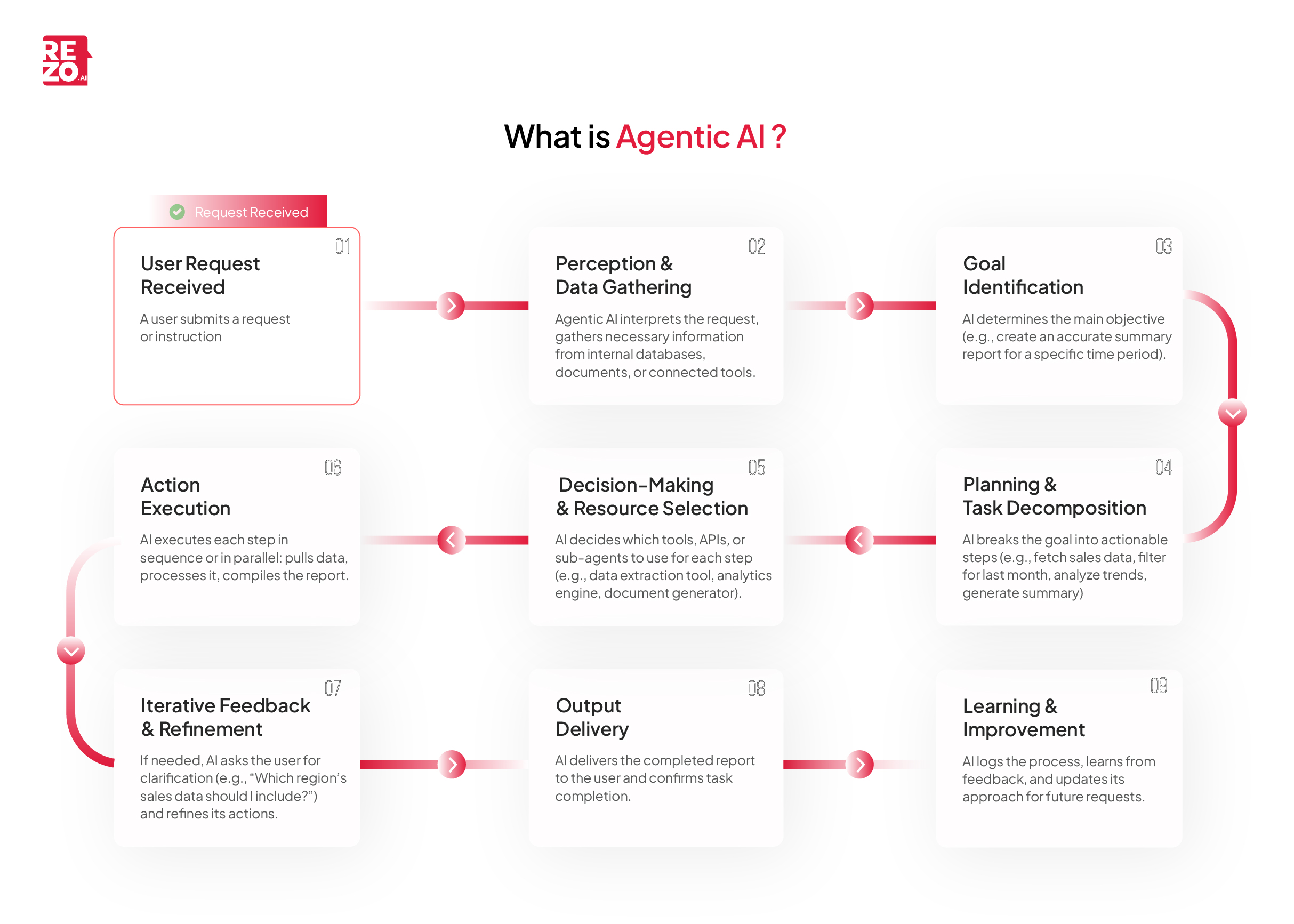
Core Features of Agentic AI
- Autonomous Decision-Making: It empowers Agentic AI to independently execute complex, multi-step customer requests without human intervention. Autonomous agents are designed to effectively tackle intricate tasks by leveraging advanced technologies and collaborative methods to address complex problems. Unlike traditional chatbots that often require step-by-step prompts or escalate anything beyond simple queries, Agentic AI can comprehend layered instructions and take decisive action. For example, when a customer asks to reschedule a delivery and update their address simultaneously, Agentic AI not only understands the multifaceted nature of the request but also accesses relevant databases, confirms changes, updates the customer profile, and notifies all necessary systems.
- Multimodal Reasoning: It allows Agentic AI to analyze intricate situations and dynamically adjust its approach as new information emerges. When a customer’s issue involves multiple products or services, Agentic AI can understand customer sentiment, identify dependencies, prioritize tasks, and shift strategies if a new, more urgent query arises during the process. This level of contextual awareness ensures that customers receive cohesive and relevant solutions even as their needs evolve in real time thus reshaping customer service.
- Proactive Intervention: This is a defining capability that moves Agentic AI from reactive to truly anticipatory. Rather than waiting for customers to report issues, Agentic AI continuously monitors relevant customer data and customer interactions to predict potential problems before they arise. If it detects that a shipment is delayed or notices a pattern that suggests a recurring product issue, it can proactively reach out to affected customers with solutions or compensation offers. By improving customer experience, companies can boost retention rates and decrease churn, leading to enhanced customer satisfaction and improved customer service metrics.
- Continuous Learning: Self-learning and continuous adaptation are central to Agentic AI’s ongoing effectiveness. By leveraging historical data and customer feedback, Agentic AI incrementally improves its responses and decision-making capabilities. Over time, it recognizes patterns-such as recurring product issues-and proactively refines troubleshooting steps or escalates persistent problems. This continuous learning loop enables Agentic AI to evolve and enhance the quality and relevance of its support thus increasing customer satisfaction.
What does Agentic AI mean for Enterprise Customer Service?
Agentic AI is redefining what enterprises can expect from their customer service operations, unlocking a new level of efficiency, intelligence, and customer-centricity that was previously unattainable with traditional support models. The pivotal role of large language models (LLMs) in enhancing natural language understanding is fundamental to this transformation.
Agentic AI empowers AI agents to operate autonomously, adapt to dynamic situations, and collaborate with humans, equipping them with tools to enhance their learning capabilities and handle complex tasks effectively.
Key Benefits of Agentic AI in Customer Service
- Unprecedented End-to-End Automation
One of the most transformative benefits for enterprises is Agentic AI’s ability to autonomously manage entire, multi-step workflows and complex tasks across departments and systems. Instead of relying on disparate bots or manual interventions, Agentic AI agents can orchestrate everything from verifying purchases and checking warranty eligibility to coordinating logistics and updating customers in real time.
For example, if a customer reports a defective product, Agentic AI can simultaneously validate the claim, trigger a replacement, update inventory, and communicate status updates-delivering a seamless, anticipatory experience that mimics human like interactions. - Proactive and Personalized Customer Engagement
Enterprises can now move from reactive problem-solving to proactive engagement. Agentic AI continuously monitors data streams, detects issues before they impact customers, and initiates resolutions autonomously.
Imagine a scenario where a shipping delay is detected: the autonomous AI agent not only notifies the customer but also offers alternatives like expedited shipping or compensation, all tailored to the customer’s purchase history and loyalty status. This level of personalization and anticipation was not possible with rule-based systems, and it leads to higher customer satisfaction and loyalty. - 24/7, Multilingual, and Omnichannel Support
With agentic AI, enterprises can deliver consistent, high-quality support around the clock and across channels-whether via chat, email, voice, or social media. The AI maintains context as customers move between platforms and can communicate fluently in multiple languages, ensuring global customers receive the same level of service without the need for a proportional increase in human staff. This scalability is a game-changer for growing businesses and global brands. - Operational Efficiency and Cost Reduction
By automating routine and repetitive tasks, agentic AI significantly reduces the workload on human agents, allowing them to focus on complex, high-value interactions. This leads to substantial cost savings, as fewer resources are needed to handle high volumes of standard queries. Additionally, its ability to resolve issues on the first contact reduces repeat inquiries, further lowering operational expenses and improving first-call resolution rates. - Smarter Insights and Continuous Improvement
Agentic AI doesn’t just resolve issues, it learns from every interaction. By analyzing customer data, feedback, and outcomes, it refines its processes and recommendations, ensuring that service quality continually improves. It also provides enterprises with actionable insights into customer behavior, emerging trends, and pain points, empowering smarter business decisions and more targeted CX strategies. - Seamless Integration and Real-Time Adaptation
Modern agentic AI frameworks are designed to deeply integrate with enterprise systems like CRM, ERP, and supply chain management. This ensures that actions taken by the AI are synchronized across the organization, eliminating silos and enabling real-time adaptation to changing business needs or unexpected disruptions-such as rerouting logistics during delays or reprioritizing support queues during peak times.
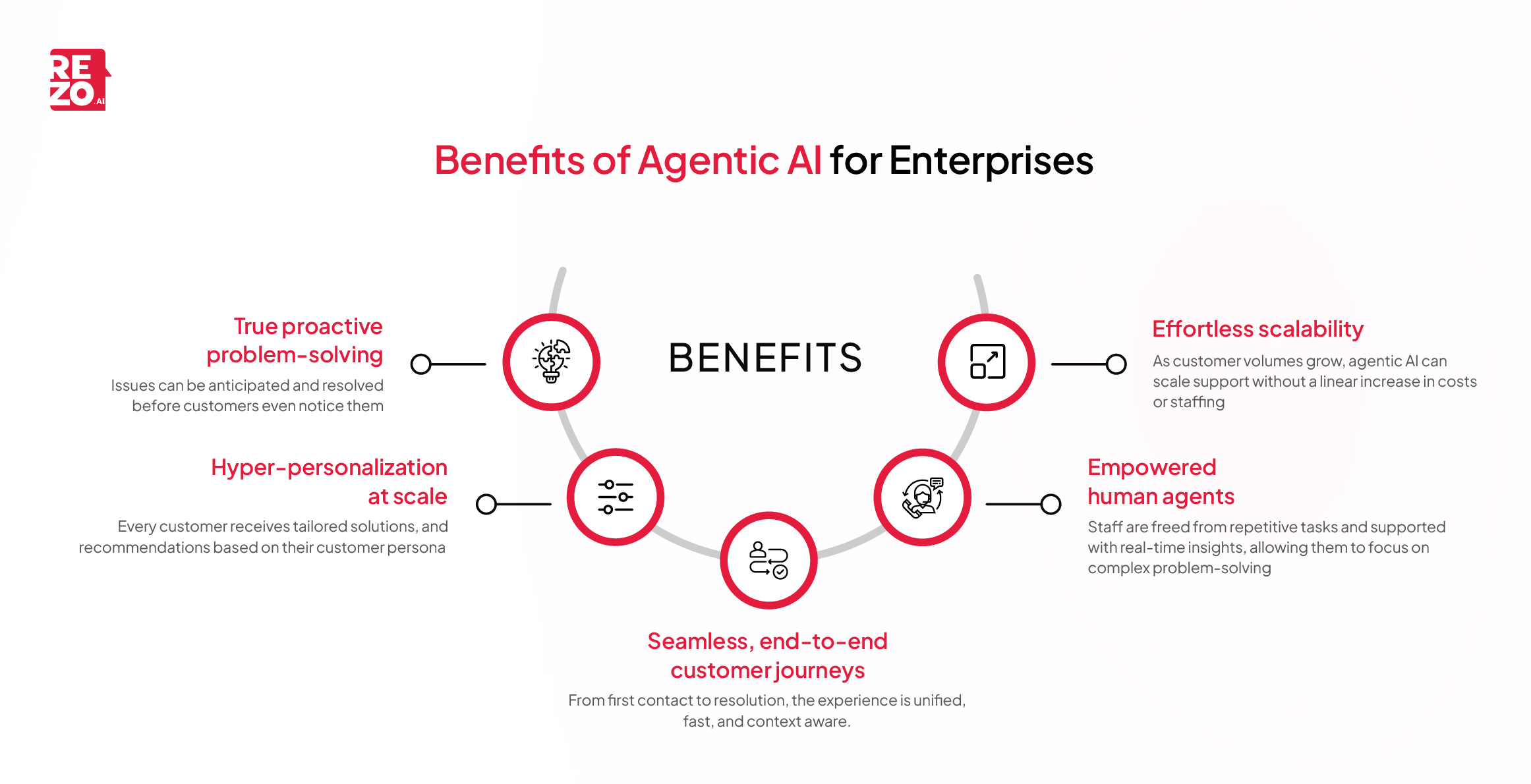
Applications of Agentic AI in Customer Service
According to a Cisco report, Agentic AI systems are projected to handle 68% of customer questions and customer service processes by 2028, marking a major shift from traditional customer support that depends on support agents and customer service agents. These autonomous AI systems analyze customer data and effectively resolve complex inquiries without human intervention.
Some of the applications of Agentic AI in Customer Service are:-
End-to-End Autonomous Query Resolution
One of the most significant applications of Agentic AI in customer service lies in its ability to autonomously resolve complex, multi-step customer queries, emphasizing the efficiency and cost-saving benefits of utilizing AI agents alongside human employees. Unlike rule-based bots that often get stuck on anything beyond simple requests, these AI agents can independently tackle complex tasks and handle end-to-end workflows that span multiple systems.
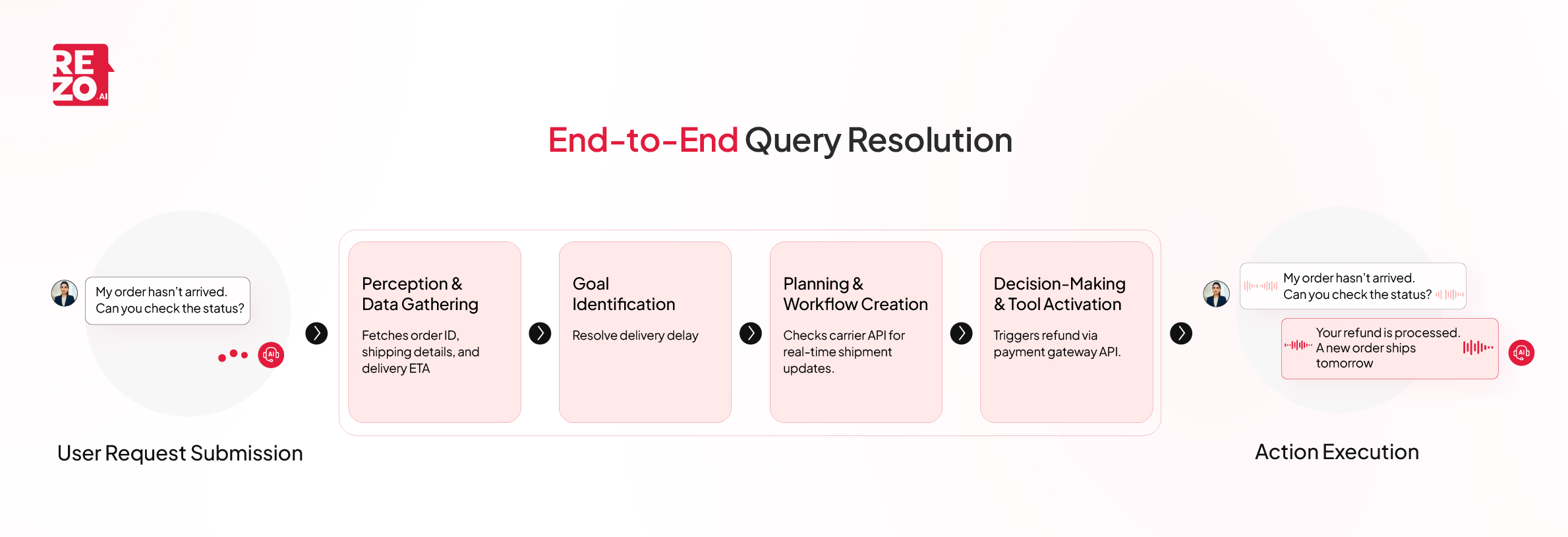
For instance, when a customer submits a warranty claim by uploading a photo of a defective product, Agentic AI can instantly verify the purchase in the CRM, check the warranty status, approve the claim, dispatch a replacement, and update inventory records-all within a matter of minutes and without human intervention. This level of autonomy not only accelerates resolution times but also frees up human agents to focus on more nuanced, high-value interactions, as these AI technologies are designed to operate independently.
Hyper-Personalized Customer Interactions with Large Language Models
Personalization is another area where Agentic AI excels. Advancements in machine learning algorithms have empowered the growth of Agentic AI, enabling it to excel at specific tasks by synthesizing data from past interactions, real-time behaviour, and external factors to deliver highly personalized recommendations and solutions. By synthesizing data Agentic AI delivers recommendations and solutions that are truly tailored to each customer. Agentic AI enables AI agents to perform tasks and make decisions independently without the need for constant human oversight.

In retail, for example, an AI agent can analyse a customer’s browsing habits and recent purchases, cross-reference them with upcoming weather forecasts, and proactively suggest camping gear upgrades just before peak season. Similarly, in banking, Agentic AI agents can detect patterns such as frequent international transactions and automatically offer relevant services, like waiving foreign exchange fees or suggesting travel insurance, thereby deepening customer engagement and loyalty.
Predictive and Proactive Care
Perhaps most transformative is Agentic AI’s capacity for proactive intervention by continuously monitoring real-time data to anticipate and address issues before they escalate. Agentic AI agents not only generate content but also features the capability to execute tasks autonomously, enhancing efficiency across various industries. Rather than waiting for customers to reach out with problems, these AI agents continuously monitors data streams to anticipate and address issues before they escalate. If a shipping delay is detected, the AI can automatically notify affected customers, offer alternative solutions or discounts, and update delivery estimates-all without the customer having to ask.
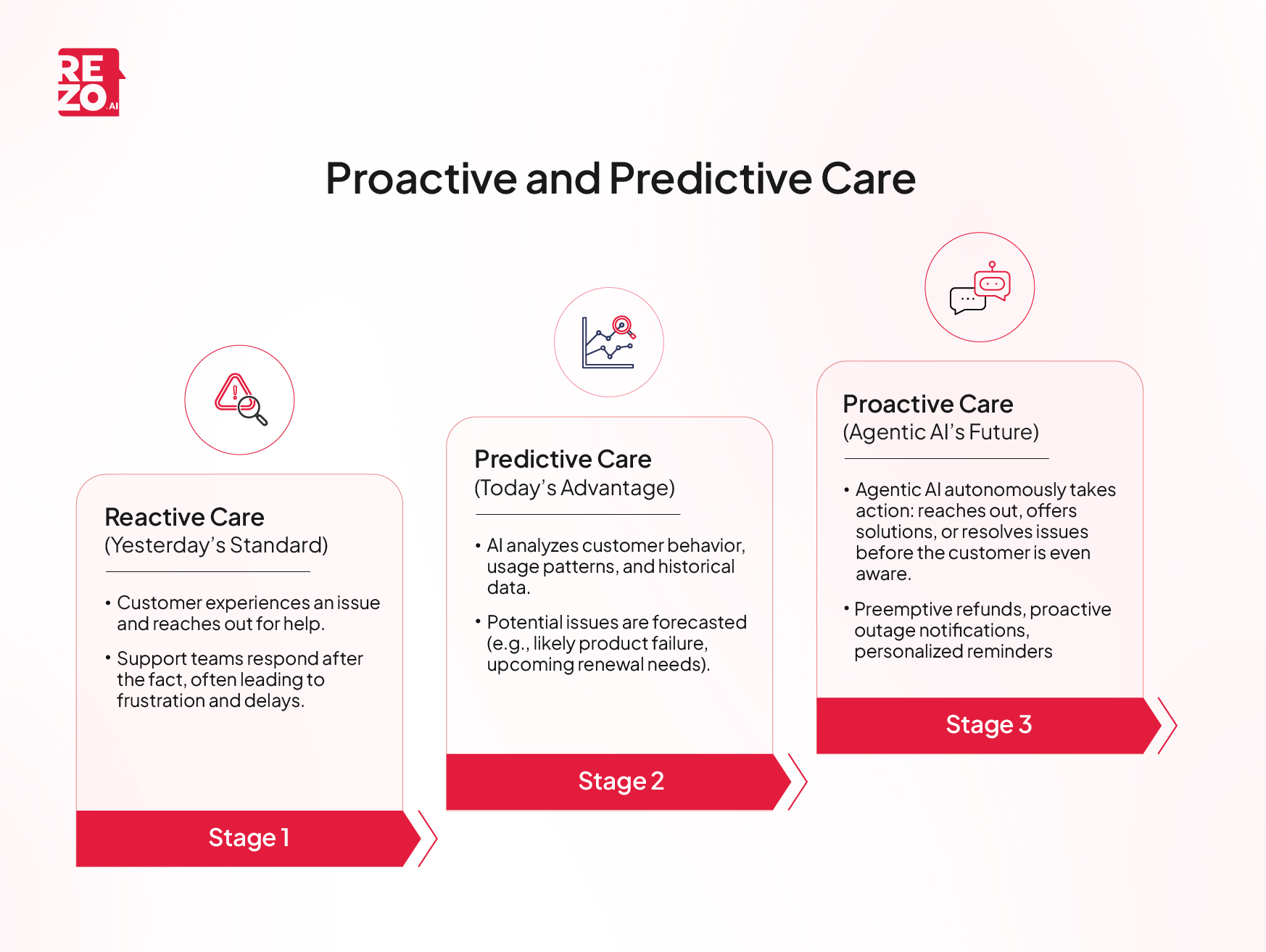
In healthcare, Agentic AI can analyze patient records to spot gaps in insurance authorizations and proactively resolve them, reducing administrative delays from days to mere minutes. This AI tool not only improves customer engagement and satisfaction but also empowers customers with personalized support and resources.
Multilingual and Omnichannel Orchestration
Agentic AI agents also excels in delivering consistent, high-quality support across multiple languages and channels. Enterprises can now provide true omnichannel experiences, where a customer might start a conversation on WhatsApp, continue it via email, and finish it over a phone call-while the AI agent maintains full context throughout. This multilingual and cross-channel orchestration ensures that customers receive coherent, personalized service no matter how or where they choose to engage.
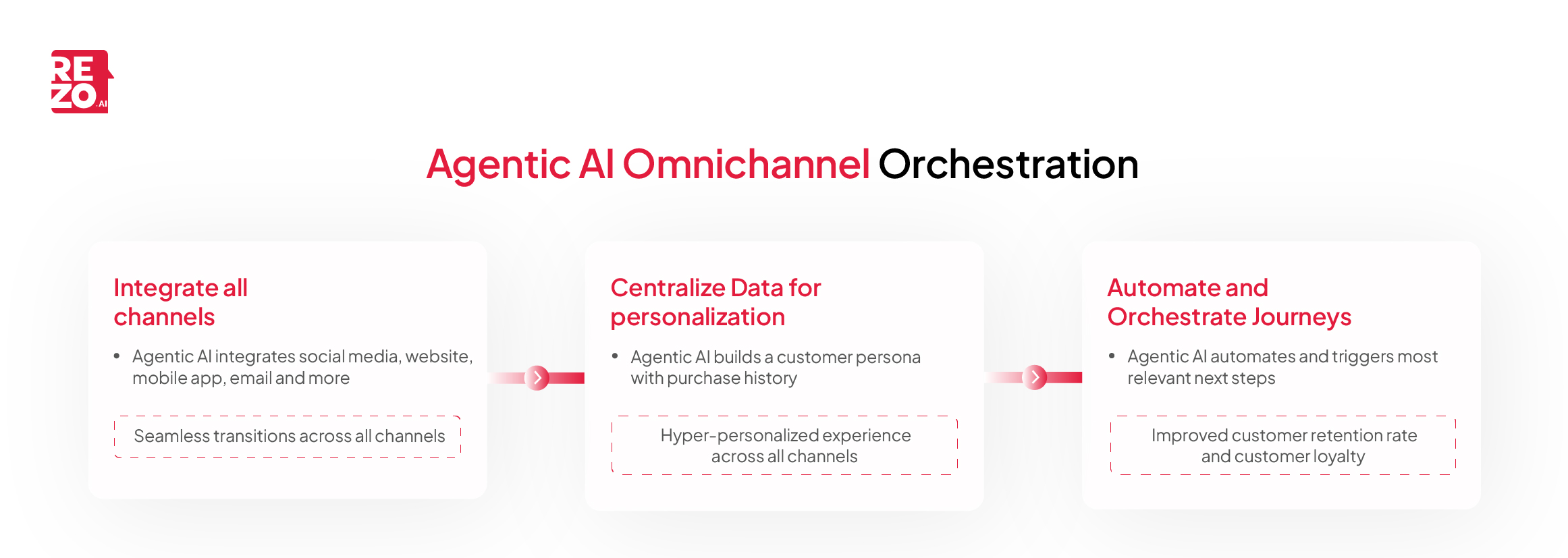
Agentic AI system excels in seamlessly integrating with existing enterprise systems and workflows, ensuring consistent and high-quality support across multiple languages and channels.
Back-End Workflow Automation
Beyond customer-facing interactions, Agentic AI is revolutionizing back-end operations by integrating with existing enterprise systems to automate internal workflows such as ticket categorization, inventory management, and demand forecasting. Early chatbots were limited in their ability to understand complex situations and adapt to unexpected user inputs, making it difficult for them to handle complex scenarios. For example, by analyzing historical sales and social media trends, the AI can predict inventory needs and automate replenishment orders with remarkable accuracy. This not only streamlines operations but also reduces costs and minimizes errors. Advancements in machine learning algorithms and computational power have contributed to the emergence of dynamic automation and AI solutions.
Sentiment-Driven Engagement with Natural Language Processing
Sentiment analysis is another powerful application. Agentic AI can anticipate customer mood and intent by analyzing tone, speech patterns, and interaction history, and automate complex workflows to streamline processes across various departments. If it detects rising frustration, the AI can escalate the case to a human agent for relevant responses, providing them with full context to ensure a smooth handoff. Conversely, it can identify loyal or at-risk customers and tailor engagement strategies accordingly, such as offering special promotions or personalized content recommendations. By addressing biases in AI processes and ensuring fairness, Agentic AI helps maintain strong customer relationships, which are foundational to nurturing trust and loyalty.
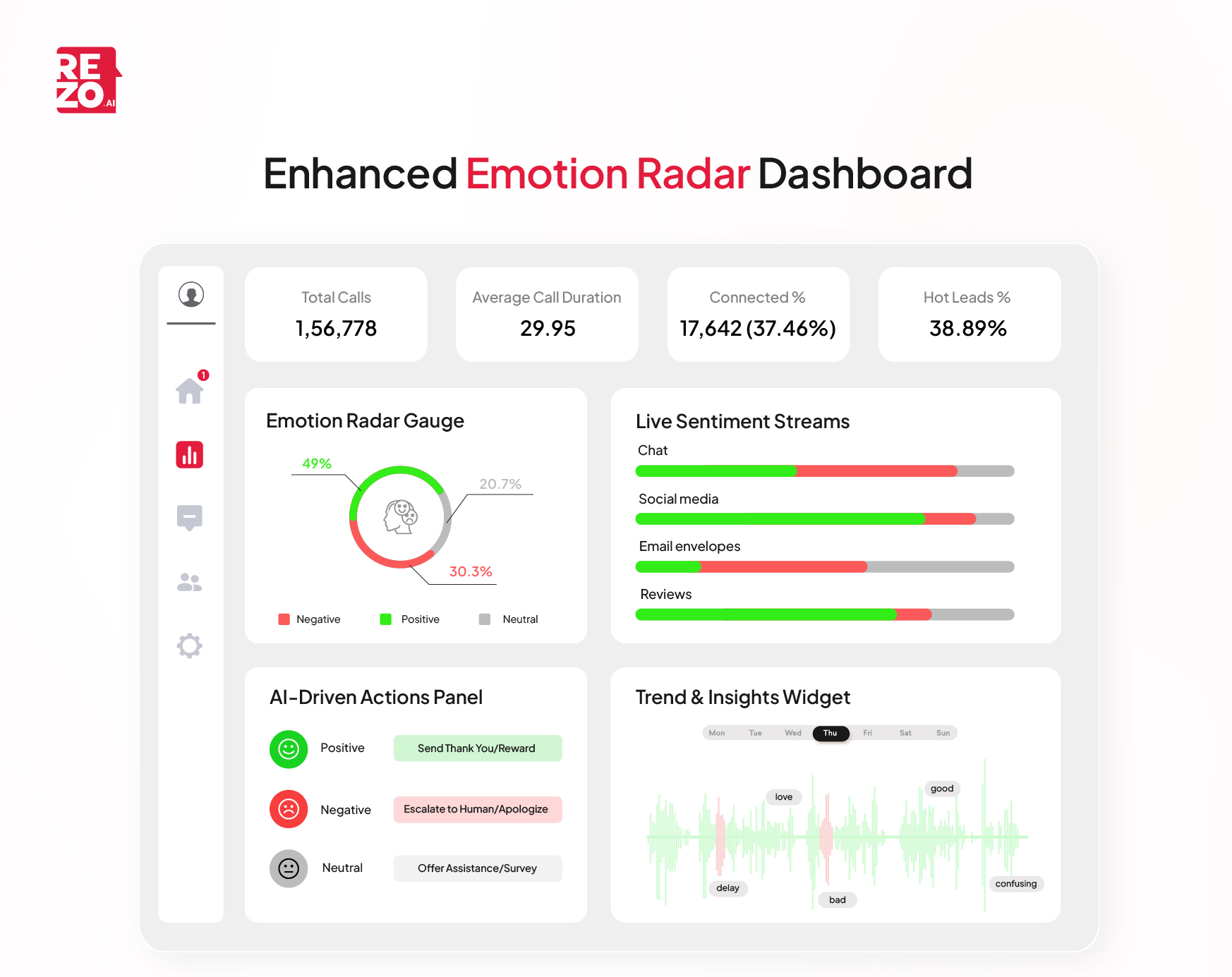
Conclusion
Agentic AI is ushering in a new era for customer service, one defined by autonomy, intelligence, and seamless personalization. As an advanced artificial intelligence system capable of making autonomous decisions and executing complex tasks without continuous human supervision, the agentic AI framework empowers enterprises to deliver always-on, proactive, and highly individualized experiences that meet and exceed modern customer expectations.
By autonomously resolving complex queries, learning from every customer conversation, and adapting in real time, it dramatically reduces response times and operational costs, with minimal human intervention, while simultaneously boosting customer satisfaction and loyalty. By leveraging a network of multiple agents working together across distributed systems, it enhances system efficiency and performance, improving user interactions and task management.
Enterprises that embrace this innovation will be best positioned to differentiate themselves, enhance customer relationship management, and thrive in a rapidly evolving digital landscape.
Frequently Asked Questions
What is an example of Agentic AI?
Rezo AI's unified CX platform is a true example of Agentic AI. Rezo's autonomous agents can understand and interpret customer queries, provide personalized responses, and execute multi-step processes independently. Rezo AI's agentic AI adapts to unique customer needs and provides solutions autonomously.
How can contact centers leverage Agentic AI?
Contact centers can leverage Agentic AI systems in numerous ways such as autonomous customer interactions, intelligent workflow automation, sentiment analysis, personalized interactions, automated and intelligent QA processes.
How is Agentic AI different from Generative AI?
Agentic AI focusses on autonomous action while Generative AI's focus is in content creation. Generative AI excels at producing text, images, or code based on prompts and Agentic AI is designed to independently perceive situations, make decisions, and take actions to accomplish specific goals with minimal human oversight. Agentic AI follows a four-step approach of perceiving, reasoning, acting, and learning, enabling it to not just respond to requests but proactively solve problems.
How is AI used for customer service?
AI agents resolve customer inquiries and complex issues by understanding customer needs and providing proactive support. Solutions like chatbots and voicebots deliver accurate responses instantly, and by leveraging predictive analytics, they recommend the next best actions to enhance customer satisfaction.
What are the benefits of AI in customer service?
Automation and AI in customer service provide 24/7 support and deliver instant responses with relevant data. AI customer service agents can work independently, reducing the workload on human agents and mimicking human interactions.
Frequently Asked Questions (FAQs)

Take the leap towards innovation with Rezo.ai
Get started now







